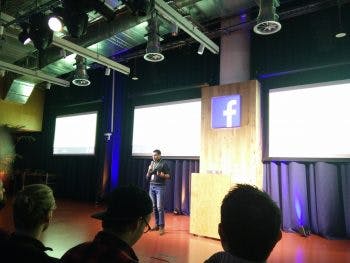How coding can build a community
A few weeks ago, I was sitting at my desk in POP HQ, when a photograph of one of our engineers, Amit, speaking at a Facebook event, pinged up on my screen. In itself, that’s pretty exciting, but when I dug a little deeper, the story behind it and the work he and another of our engineers, Kash are doing is nothing short of inspiring.
Amit was talking at an event for Code Your Future, which is a London-based start-up, that helps refugees through free computer programming lessons.

I was so impressed by what I was reading, I asked Amit and Kash to take some time out of their busy schedules to have a coffee with me ( basically bribe them with caffeine), and tell me more about Code Your Future.
- Q: So guys firstly, how did all of this come about?
Kash: “Funnily enough it actually all started with a facebook post I saw on a London Entrepreneurs site. The man behind the post was German Bencci. Inspired by the success of a similar program launched in Amsterdam called HackYourFuture.”
“German had an idea of how to start it in London and took to Facebook to share his ideas and ask for others to get involved. I responded and within two to three weeks the school was operational. To get it off the ground we received such an outpouring of support from refugee charities that helped us connect with students, as well as local businesses offering space and most overwhelmingly from volunteers and mentors who came forward, wanting to make a tangible difference.”
- Q: So what about that post resonated with you and motivated you to get involved?
Kash: “I myself was a refugee, I had to flee Iran and the political unrest in 1999 so I know personally the importance of providing a community and a vision for the future, it helps you integrate within society, as you can feel very isolated especially in the current climate of Brexit and Trump. I think that is why it has been easy to find mentors, everyone wants to do what they can to counteract the political climate.”
Amit: “Kash shared the information on Slack and I knew I wanted to get involved, I know this will sound silly, but I really wanted to give back to the country and community and be productive”.
- Q: Knowing how busy you are at work, as it’s not really a nine to five job, if there are any issues with the platform we need you or one of the team on call, has that made it challenging to stay motivated and to keep giving your time, as Sundays are usually a day of relaxation!
Both: “Well you don’t actually have to teach every Sunday, all of the mentors are professional coders/ developers so you tend to lead on modules as the programme is broken down into different modules, so we were leading on advanced Javascript and React, which is a product from Facebook we use to build websites, don’t worry we won’t get more technical …”. (audible sigh of relief from me)
- Q: With the first cohort of refugees soon to be completing their 6- month course, are there future plans to expand?
Kash: “Yes, we do have a lot of plans coming up. We are in the process of starting a school in Scotland, potentially teaming up with the Scottish government as 40% of the UK’s intake of refugees has gone to Scotland so there is a huge need for initiatives up there. We want to have more classes in London, but that depends mostly on space, we have been lucky to have been given space by companies and start-ups so far, and we’re hoping more might step forward in the future.”
Amit: “We are really proud that not only is the initiative diverse in terms of attendees being from such a range of backgrounds and places from Afghanistan to Uganda and Syria to name a few, but we are really happy that we are 50% male and female with equally as many female mentors as male, so moving forward we want to ensure this stays the same, and ensure we encourage women into coding and developing”.
- Q: Those are some incredible growth plans, how can I and others get involved, what can we do to support?
Both: “Well obviously we always welcome mentors, not just developers and coders who can teach but also those who can come in and do sessions on soft skills, we want to help our students get jobs so advice on interviewing techniques, CV writing and marketing, anything that will help them through building confidence, relevant skills and training. Not everyone has to be on-site either, we also have mentors who do online reviews of the students work from as far away as America, so not being in London doesn’t mean people can’t get involved. Space would be great, if places are willing to offer us more space we can look to support more students, we are also always in need of laptops and equipment, so any help there is always very much appreciated. Though maybe most importantly if anyone or any companies are able to offer work experience that is what our students really need, so that is our main focus, helping them into employment.”
After our conversation it struck me how impressive they are, not just in their professional capacity through what they and their team are building here at POP, but by who they are as people. Their personal actions to counteract the growing voice of xenophobia in today’s society, and their desire to make a tangible difference to people’s lives has really inspired me. I want to do what I can to get involved, and do my bit.
To find out more about this fantastic initiative, click on the links below:
Wired Magazine’s article about the school
